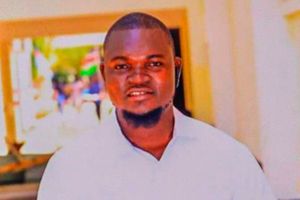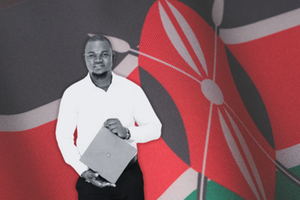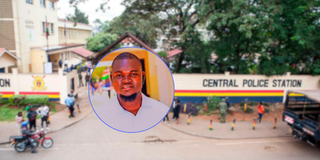
Ojwang’s arrest was occasioned by a complaint by Deputy Inspector-General (DIG) of the Kenya Police Service, Eliud Lagat.
MPs will on Tuesday table a report in Parliament with recommendations after interrogating various parties involved in last week’s death of teacher and blogger Albert Ojwang in police custody.
This comes as the Independent Policing Oversight Authority (Ipoa) ties up loose ends with focus on some officer who are allegedly implicated in the case.
The National Assembly’s Committee on Administration and Internal Security will table its report amid a web of conspiracies, cover-up claims, and potential abuse of power.
In the meantime, CCTV footage obtained by Citizen TV confirmed Ipoa’s position that Mr Ojwang had already died by the time he was rushed from Central Police Station to Mbagathi Hospital.
The clip also disputed the police theory of the time the teacher was taken to hospital. It shows that the officers arrived at 1:35am and were in no hurry to take Ojwang to the hospital. That happened more than 20 minutes later when a stretcher was brought. The hospital had indicated in its statement that the teacher-cum-blogger was dead when he was taken to the facility.
Ojwang’s family and members of the public are getting anxious over the pace and direction of the investigations ahead of the tabling of the report by the committee chaired by Narok West MP Gabriel Tongoyo.
“This matter is causing a lot of anxiety. For those of you who have read the book ‘Steve Biko’; it (Albert Ojwang’s death) sounds like a Steve Biko story,” National Assembly Speaker Moses Wetang’ula said on Wednesday, in reference to the South African activist who was beaten to death by police after his arrest in August 1977, sparking national and global posthumous fame.
At the heart of the controversy is the role of senior police officers such as Deputy Inspector-General Eliud Lagat, who initiated a complaint that led to Ojwang’s arrest and transfer from Homa Bay to the Nairobi where he died under mysterious circumstances.
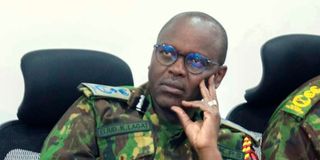
Deputy Inspector-General of Police Eliud Lagat.
On Thursday, Inspector-General of Police Douglas Kanja and Director of Criminal Investigations Mohammed Amin told lawmakers that Mr Lagat does not need to step aside for now. Mr Kanja said the law requires those adversely mentioned to step down once they record statements with Ipoa.
The Ipoa investigations have revealed that Ojwang died at Central Police Station cells. The agency’s chief executive officer Elema Halake was on Friday evening at pains to explain to the media whoever gave the arresting orders to the junior officers who executed the same.
By the end of the first week, neither the senior officers nor Ipoa could explain the role of the Deputy Inspector-General in Ojwang’s arrest, beyond the complaint.
Mr Lagat did not appear in any of the parliamentary sessions to answer questions. Mr Kanja appeared in the House with the other Deputy Inspector-General, Mr Gilbert Masengeli (in charge of Administration Police), alongside Mr Amin.
According to Ipoa’s findings, the murder happened between 9.32pm and 1.40am. The police had claimed that Ojwang “sustained head injuries after hitting his head against the cell wall” and was taken to Mbagathi Hospital, “where he was pronounced dead on arrival”.
However, the hospital, in its official report, said that contrary to the police narrative, Ojwang was “unresponsive” and “no signs of life were noted”.
Ipoa indicated that it had obtained the Occurrence Book extracts from Mawego Police Station, adding that it had collected blood samples from the scene and analysis done.
Police Constable James Mukhwana was arrested on Friday and taken to court. Ipoa said he was at work on the day of the incident. Central Police Station boss Samson Talaam was also arrested Friday, with Ipoa placing him at the centre of the saga.
Ipoa briefed the National Assembly committee in a closed-door session, but the lawmakers were far from satisfied.
In a scathing critique, Suna West MP Peter Masara questioned the suspicious timeline of events that followed Mr Lagat’s complaint to the DCI.
Tampering with the CCTV footage
“The Deputy Inspector-General complained on June 8, there was no time[stamp], a team was assembled, there is no time[stamp], the same team wrote to the Communication Authority (CA), there is no time[stamp] and a team was dispatched to Homa Bay,” said Mr Masara. “You cannot assemble a team and within no time, that team is already at the CA.”
The committee is demanding specific timings; when the complaint was lodged, when cybercrime officers were assigned, when communication with the CA occurred, and when officers were dispatched to arrest Ojwang’.
Lawmakers also want clarity on whether the officers involved were acting independently or under instructions, and whether the Inspector-General and the DCI boss were aware of the entire operation.
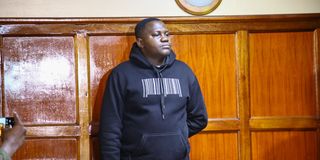
James Mukhwana, the main suspect in the murder of Albert Ojwang arraigned at Milimani Law Court on June 13, 2025, as IPOA seeks to detain him for 21 days to allow investigation.
DCI boss Amin attempted to explain that given the type of the matter, the detectives believed that the crime was committed in Nairobi. But he could not exhaustively explain why Ojwang could not presented to a court near the point of arrest.
Mr Kanja told MPs that he takes full responsibility for the actions of officers under his command. Mr Talaam and Mr Mukhwana are under scrutiny, as Ipoa advances what it describe as a “critical stage” of their investigation. The investigations are underaway amid claims of tampering with the CCTV footage that contained crucial information.
“The CCTV system located at OCS’s office had been interfered with. DVR power cable was disconnected, the DVR logs indicated that the operating discs had been changed and formatted on 8th June 2025 at 07:28:43hrs and 07:32:29hrs,” Ipoa told journalists, adding that a civilian, who interfered with the CCTV system, was also arrested.
An MP present at the meeting told Sunday Nation that Ipoa is relying heavily on Mr Talaam and junior officers to reveal the masterminds of the crime.
“The overzealousness in which they acted must be questioned. They must have been taking instructions from somewhere. From clearing the cells, disconnecting the CCTV and the kind of beating Ojwang received, it’s clear they were not acting on their own,” said the MP.
The committee also wants the identities — including ranks and service numbers — of all officers involved in Ojwang’s arrest and transfer.
According to Ipoa, five officers travelled to Homa Bay on June 7, 2025: Senior Sergeant Sigei, Sergeant Wesley Kipkorir Kirui, Constable Dennis Kenyoni, Constable Milton Mwanze, and Constable Boniface Rabudo.
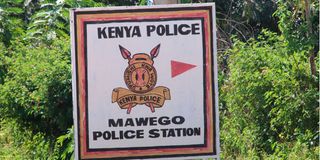
A signpost of Mawego Police Station where Albert Ojwang was briefly held before being transferred to Nairobi.
Ojwang was arrested at around 2.30pm, booked at Mawego Police Station under OB 10/7/6/2025, then mysteriously released and transported to Nairobi. He was booked at Central Police Station at 9.31pm under OB No. 136/7/6/2025.
Lawmakers are also investigating who was involved in moving Ojwang’s body from the cell to Mbagathi Hospital, especially after it emerged that he was already dead at the time.
The committee is demanding a complete digital Occurrence Book record — including booking time, routine cell checks, names of officers on duty, and their reports. The MPs are also pursuing a full report from Mbagathi Hospital for independent review, despite Ipoa already filing it with the DCI.
Notification of death
According to the medical report signed by Dr Shah Mitali at Mbagathi Hospital, Ojwang arrived at the facility dead. The officer accompanying him claimed the injuries were self-inflicted. But Dr Mitali’s findings painted a grim picture.
“On examination, no signs of life were noted. No cardiac activity appeared to be notable. The medical officer on call assessed the male and confirmed it to be a corpse brought in dead,” reads the report.
The report further noted that Mr Ojwang “was unresponsive, with no spontaneous breathing, no cardiac activity, a cold body, a swollen face, multiple bruises, and a scalp cut on the parieto-occipital region”.
The hospital issued a notification of death and directed the officers to report at Kenyatta Police Station and transfer the body to a mortuary.
Ipoa has since collected statements from all five arresting officers, hospital staff, and officers at Central Police Station. The authority said on Friday that all key witnesses have been identified and interviewed.
Despite Ipoa’ making progress in the investigation, the parliamentary committee has emphasised the need for full transparency.
The key question remains; who ordered the brutal treatment that led to Ojwang’s death—and how deep does the conspiracy go?


